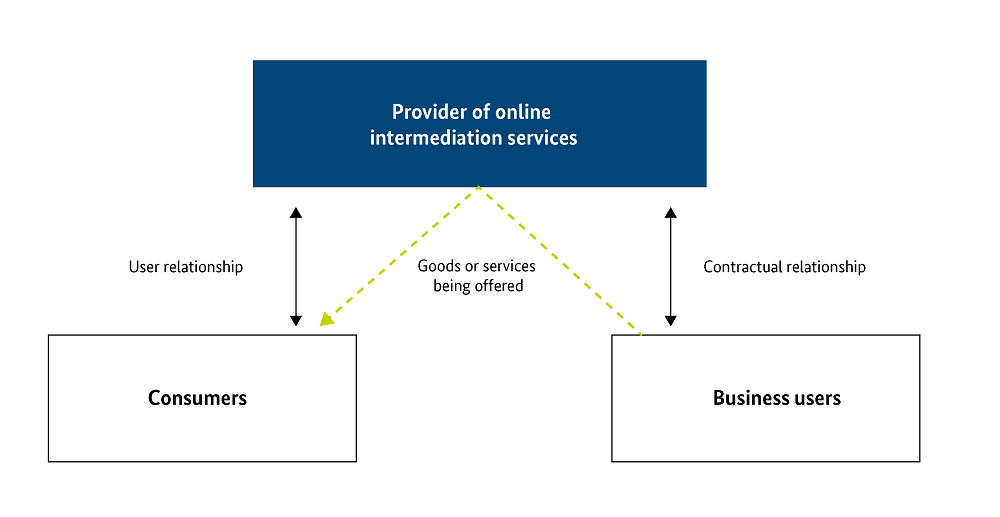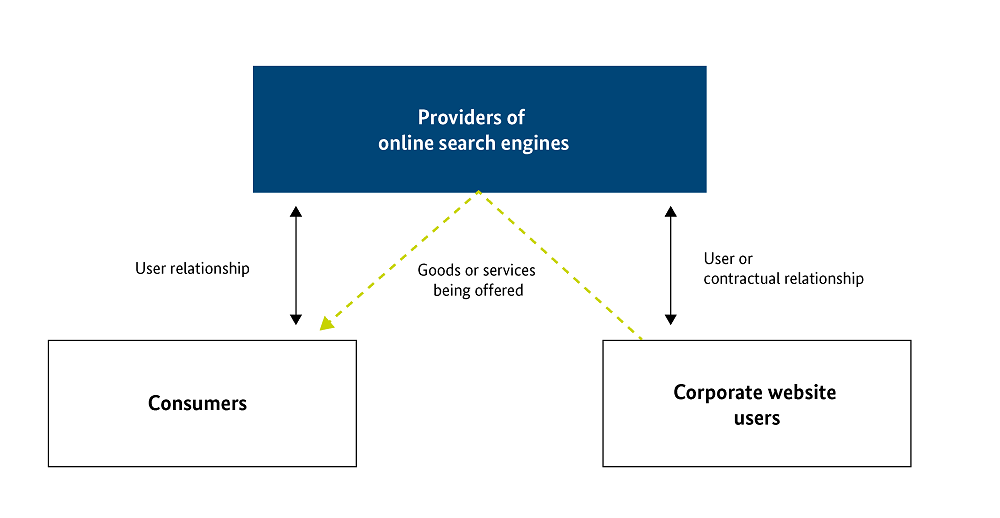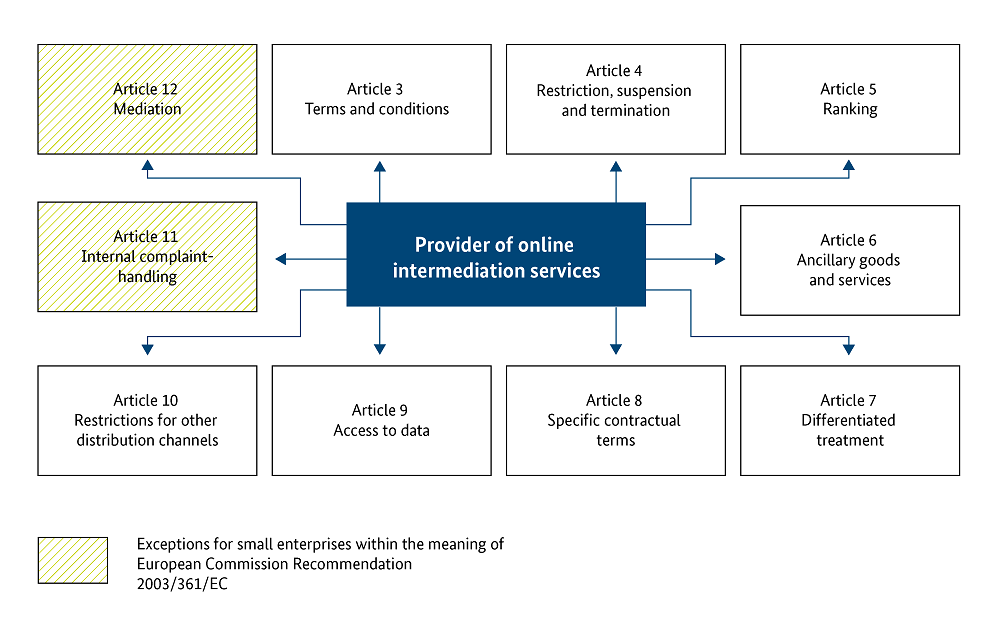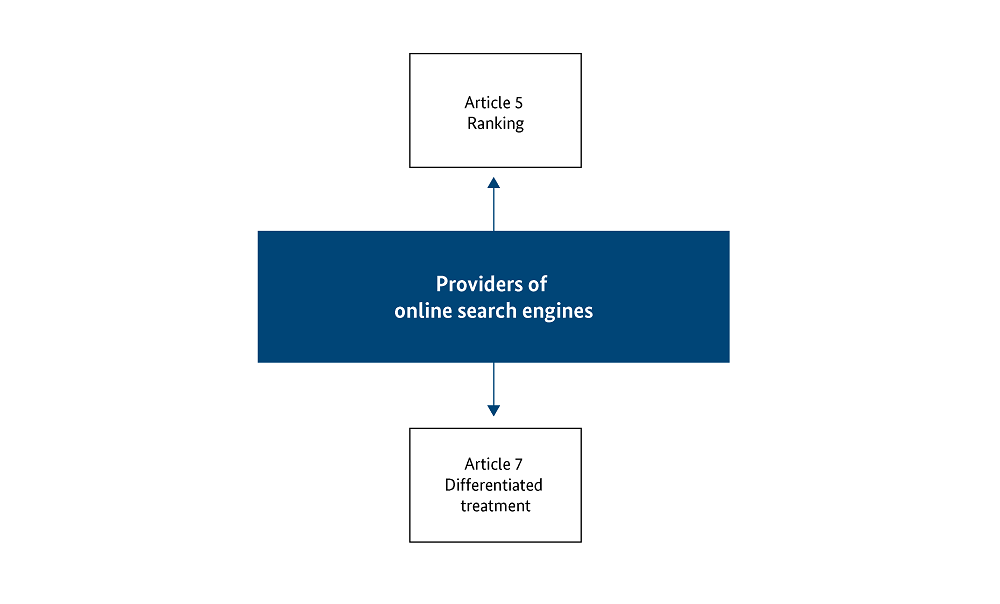Platform-to-business Regulation Fairness and transparency for business users of digital services
Platforms and search engines have digitalised trading and today play a significant role in making goods and services available online to consumers. Online traders rely on platforms as marketplaces. Clever product listings and rankings help to increase revenue. As an interface between traders and inquiring consumers, platforms have a decisive position and can thus limit business models.
- Latest news
- What is the purpose of the P2B Regulation?
- Who is protected?
- Who must comply with the P2B Regulation?
- What is an online intermediation service?
- What is an online search engine?
- What are the key obligations for providers of online intermediation services?
- What are the key obligations for providers of online search engines?
- What about compliance with transparency requirements?
- What should I do if there is a violation?
- Archive
Latest news
On 5 February 2026 the Bundeskartellamt prohibited Amazon.com Inc. (Seattle, USA) and Amazon EU S.à r.l. (Luxembourg) (collectively referred to as “Amazon” below) from using price control mechanisms to influence the prices charged by third-party sellers on the German Amazon Marketplace. The Bundesnetzagentur, which is responsible for enforcing the Platform-to-business Regulation (P2B Regulation), was involved in these proceedings by contributing its expertise with regard to the P2B Regulation’s transparency and fairness requirements applicable to platform operators.
Amazon uses various price control mechanisms to monitor the prices charged by Marketplace sellers. If the mechanisms used identify the sellers’ prices as being too high, the sellers’ offers are either removed from the Marketplace completely or not displayed in the prominent Buy Box. Restricting the visibility of sellers’ offers in this way can result in significant losses in sales.
The price control mechanisms are also based on non-transparent rules and notifications. It is not sufficiently clear to Marketplace sellers which principles Amazon uses to set the price caps or approximately what the level of the price caps could be. Marketplace sellers are unable to foresee under which specific circumstances their offers will no longer be visible on Amazon or the visibility of their offers will be restricted.
The Bundeskartellamt considers this systematic intervention in Marketplace sellers’ pricing freedom to constitute unlawful abuse under the special provisions for large digital companies (section 19a(2) of the German Competition Act – GWB) and violation of the general abuse provisions in section 19 GWB and Article 102 of the Treaty on the Functioning of the European Union (TFEU).
The Bundeskartellamt’s press release is available online: Bundeskartellamt prohibits Amazon from applying so-called price control mechanisms
What is the purpose of the P2B Regulation?
The P2B Regulation (EU regulation on promoting fairness and transparency for business users of online intermediation services) aims to ensure a fair, predictable, viable and trustworthy online business environment. Introduced at European level in 2020, the regulation contains obligations on information and transparency as well as rules on out-of-court dispute settlements. The regulation is intended to provide EU-wide protection in particular for business users of digital services, for example if they offer goods or services in online marketplaces or in app stores.
Who is protected?
The regulation protects business users and business users with company websites (collectively called "business users") that sell goods or services to consumers. These business users must
- have their place of establishment or residence in the EU, and
- offer their goods or services through digital services to consumers located in the EU.
Consumers are thus only indirectly protected by the regulation (eg when making a purchase on an online platform).
Who must comply with the P2B Regulation?
All providers of online intermediation services and online search engines (collectively "digital services") must comply with the provisions of the P2B Regulation, regardless of where their place of establishment or residence is located. The digital services may also be based outside the EU. What is important is that the providers offer their services to business users whose place of establishment or residence is located in the EU and they sell to consumers within the EU.
What is an online intermediation service?
Providers of online intermediation services under the P2B Regulation are natural or legal persons providing or offering to provide online intermediation services.
Services are considered online intermediation services if they meet all of the following requirements:
- They constitute "information society services", which are services provided against payment at a distance, electronically and at the individual request of a recipient of services.
- The service allows business users to offer goods or services to consumers.
- The service facilitates the initiating of direct transactions between those business users and consumers, irrespective of where those transactions are ultimately concluded.
- The service is provided to business users on the basis of contractual relationships between the provider of those services and business users.
Further information is available in the European Commission's Questions and Answers (pdf / 655 KB) document.
What is an online search engine?
Providers of online search engines under the P2B Regulation are natural or legal persons providing or offering to provide online search engines to consumers.
Services are considered online search engines within the meaning of the P2B Regulation if they meet all of the following requirements:
- The service is digital.
- The digital service allows users to input queries in order to perform searches.
- The search
• is performed generally on all websites, or all websites in a particular language;
• can be performed on any subject. - Results of the search can be displayed in any format in which the consumer can find information related to the requested content.
Further information is available in the European Commission's Questions and Answers (pdf / 655 KB) document.
What are the key obligations for providers of online intermediation services?
Providers of online intermediation services must comply with the following key obligations:
- Notice periods: Notice periods of at least 15 days must be given to business users when there are plans to make changes to the terms and conditions. Where a provider of online intermediation services decides to terminate the provision of its services, it must provide notice to the business user concerned at least 30 days prior to the termination taking effect, with a statement of reasons for that decision.
- Setting out the reasons for the restriction, suspension or termination of the service: The terms and conditions must list reasons why the service may be restricted, suspended or terminated. This applies, for example, to the (temporary) removal of a product or service, or when a business user's account is closed or the entire contract with a business user is terminated. A statement of reasons for a decision to restrict, suspend or terminate the service must be provided. The statement of reasons must be provided to the business user on a durable medium such as email.
- Differentiated treatment: Providers of online intermediation services must include in their terms and conditions a description of any differentiated treatment they give or might give (eg differentiated treatment of their own products compared to those of business users). The description must include essential considerations that provide reasons for giving or possibly giving such differentiated treatment.
- Restrictions on the ability to offer goods or services under more favourable conditions through other distribution channels: It must be stated in the terms and conditions if business users might be restricted in their ability to offer goods or services under more favourable conditions than through this online intermediation service. The providers concerned must also explain the grounds for doing so. However, the transparency obligation in the P2B Regulation does not mean that other statutory regulations such as those pertaining to competition law or unfair commercial practices do not have to be taken into account. These provisions must continue to be complied with.
Main parameters determining ranking: The terms and conditions must clearly set out how a ranking is determined. This means that the main parameters for determining the ranking must be provided. It includes the relative importance of those main parameters compared with the other parameters.
Note: further details are available in the European Commission’s guidelines on ranking.
Internal complaint-handling: The terms and conditions must specify how business users gain access to the internal complaint-handling system and how it works. Complaints must be dealt with in a reasonable time frame and comparable situations must be treated equally. The information on the functioning and effectiveness of the complaint management system must be published and updated on at least an annual basis.
Note: Small enterprises within the meaning of European Commission Recommendation 2003/361/EC are exempt from this obligation and the exemption should not affect their right to set up their own internal complaint-handling system on a voluntary basis.
Identifying mediators: At least two mediators must be identified with which the providers of online intermediation services are willing to engage. Should mediators be identified who offer their services from a location outside the EU, there are certain requirements with which they must comply. A mediation process in the individual case is conducted on a voluntary basis.
Note: Small enterprises within the meaning of European Commission Recommendation 2003/361/EC are exempt from this obligation. Of course small businesses can identify mediators on a voluntary basis.
What are the key obligations for providers of online search engines?
Providers of online search engines must comply with the following key obligations:
- Differentiated treatment: Any differentiated treatment of their own products compared to those of business users that are or could be made must be set out and made available to the public.
- Main parameters determining ranking: Providers of online search engines must set out the main parameters that individually or collectively are most significant in determining ranking and the relative importance of those main parameters.
What about compliance with transparency requirements?
The following pertains to information that providers of online intermediation services must provide in their terms and conditions under the P2B Regulation and that providers of online search engines must make publicly available.
This means that information must be easy to find so that business users can take note of it. The information must already be available at the pre-contract stage. Business users must be able to keep track of all the terms and conditions that apply to them.
Information provided to business users must be clear and plain, ie in language that is understandable to business users located in Germany.
Information provided to business users must be specific and detailed. For example, online intermediation services must state in their terms and conditions what may lead to being blocked.
For example, business users of the service must be provided with clear information about any types of differentiated treatment. In addition, online intermediation services must ensure that the reasons for any restriction, suspension or termination of the service are stated in the terms and conditions.
What should I do if there is a violation?
Since May 2024 the Bundesnetzagentur has been responsible for the enforcement of this regulation in Germany (section 22 of the German Digital Services Act or DDG).
The Bundesnetzagentur is responsible if business users:
- have their place of establishment or residence in Germany and
- offer goods or services through the digital service to consumers located in the EU.
It does not matter in which country the provider of the digital service has their place of establishment or residence.
The Bundesnetzagentur can issue orders and impose fines of up to €300,000 on providers who contravene the P2B Regulation.



